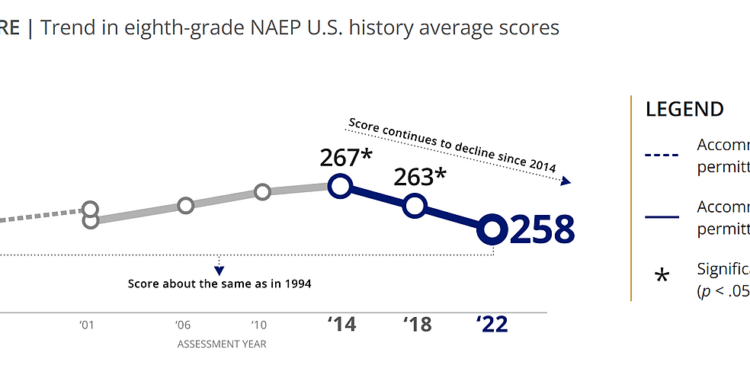The latest 8th grade National Assessment of Educational Progress (NAEP) civics and U.S. history scores are out, and they have been dropping since 2014. This will no doubt spur lamentations about the state of our kids and our democracy, and, all things equal, we should want to see scores on these tests going up rather than down. But maybe the situation isn’t as dire as it might seem.
As with all NAEP scores, there is a limit to what we can determine about the state of American education from them (especially in a hot take like this blog post). But it might be worth considering a simple proposition: we have seen drops in NAEP scores since 2013 and 2014 (depending on the years of test administration) because the No Child Left Behind Act heavily emphasized standardized testing and was replaced by the much less test‐centric Every Student Succeeds Act in 2015. Maybe standardized testing has just become less of an emphasis since NCLB.
The following charts of various NAEP tests all show peaks around 2013–2014.
Civics (Peak in 2014, though the drop by 2018 was not statistically different)
Math (Most recent results from 2022)
Reading (Also most recent 2022)
Of course, changing federal policy is not the only factor in scores – state policies, local policies, changing culture, economic conditions, and much more are at play. And it is quite likely that both COVID-19 learning disruption, and the increasing political and social radioactivity of history and civics, are at work. But looking at several subjects, and just applying a little Occam’s razor, this seems like a pretty reasonable suspect.
Perhaps the big policy question is whether falling standardized test scores should lead to major education policy revisions. I think the answer is no.
For one thing, as I touched on briefly in writing about the boom in universal school choice, there is some evidence that standardized test scores are poor predictors of outcomes we’d like to see from education, such as higher lifetime earnings and better health. It might also be that students simply do not care about NAEP – it is taken only by a nationally representative sample of children and has no ramifications for either the kids or their schools. And when it comes to civics and U.S. history, keep in mind that the latest scores are for 8th graders, who might be too young to see a lot of relevance of the subjects to their lives. Most are four or five years from voting, and history can seem really, really distant and irrelevant when you are only 13 or 14 years old. And as Bryan Caplan has shown, even if test scores are high, we tend to retain little of what we’ve ever learned.
It is better if kids know our history and understand how our system of government works than if they don’t. But if higher test scores were largely a product of teaching to tests or, worse, testing strategies versus knowledge, then we weren’t really getting what we wanted. And if we retain little of what we learn, higher test scores might not ultimately translate into more knowledgeable or active citizens.
So while it’s reasonable to be concerned about dropping tests scores, it is also important to be calm, and not let panic drive policy, especially toward relatively quick, centralized “solutions” such as an expensive federal civics and history initiative, or something like that. If anything, research points to decentralization, repeatedly finding that private schools produce more knowledgeable and tolerant citizens than public, controlling for factors like family income. But we have that lesson regardless of the latest NAEP results, which, by the way, also do not include private school scores.
There is, indeed, a big limit to what NAEP scores tell us.
















